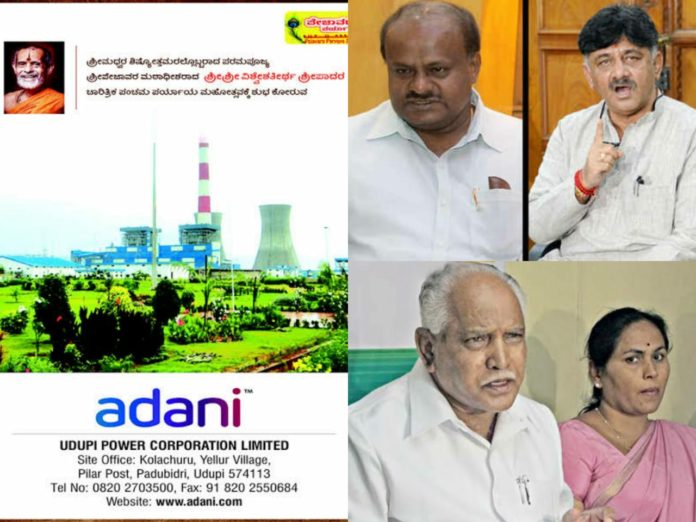The article was first published in Naanu Gauri. It is translated to English by Rajashekhar Akki.
From the outset, it is a scandal of the BJP term. When the council committee was formed, Yeddyurappa and Shobha were already back in BJP. Congress heavyweight DK Shivakumar was the chairman of the council. If so, in another Jindal case, if not Yeddyurappa, at least Shobha should have gone to jail. Everyone thought so.
8335.57 crores i.e. more than 83 billion rupees. The accusation is that from 2010 to 2018 this is the additional amount paid to UPCL for buying electricity. In former chief minister HD Kumaraswamy’s letter to the house committee. 1600 cores. This is the fine amount (late payment fine) amount the electricity companies(ESCOMs) under the government need to pay the same UPCL of Adani. This is not an allegation, it is the order given by the central electricity control board on November 8th of this year.
Now pay attention to another number; 29,413 crores. This is the estimate of loss to the government due to the ‘deal’ done by then energy minister Shobha Karandlaje during the first term of Yeddyurappa as CM. This estimate was calculated by HD Kumaraswamy. And according to him, the person who buried this report was the head of house committee, DK Shivakumar. Now the same DK Shivakumar is close friend of HD Kumaraswamy.
So, what exactly is happening in the energy department? If these losses of thousands of crores have to be borne finally by the end customers, who are getting benefitted? Which companies benefitted along with politicians? When all the other private companies are making a profit, then why is the Karnataka electricity board’s Raichur electricity unit stops functioning repeatedly? Is there a connection between these two?
This is not at all any surprising matter in officers and political circles. 30 years ago, after the chief minister’s department, the second most powerful department was revenue ministry. Likewise, though home, excise and finance ministers were outside sphere of influence, they are still powerful ministries. Now, it has been a custom to retain finance ministry by the CM. Excise ministry doesn’t count much, revenue has lost its importance. Then which ministries gained? PWD, water resources or large irrigation, Bengaluru development and power ministry. This means, departments where large amounts of works or purchasing happen, those have become powerful departments. Either those who are very close to chief minister or the bigwigs get these ministries to manage.
You’ll understand ‘importance’ of this when you look at the people who had energy ministry in the last 15 years. HD Revanna, Shobha Karandlaje, KS Ishwarappa, again Shobha Karandlaje, Siddaramaiah, DK Shivakumar, HD Kumaraswami and now BS Yeddyurappa. In buying electricity from Private thermal power plants and solar plants and in buying coal for electricity plants under government, there is potential for doing irregularity and corruption of thousands of rupees. In these, short term, midterm and long term purchase agreements are made. In these transactions even 10% commission can get hundreds of crores of money to those in decision making, thus making it an important portfolio.
Megadeals during Shobha Karandlaje’s tenure
A deal like that happened when Shobha Karandlaje was the energy minister in the Yeddyurappa cabinet; it was obvious. Things were simple and straight. The state was facing an ‘electricity deficit’ and opportunities for buying it were increasing. A tender to buy 1980 megawatt electricity was called. A lot of people participated in the tender. One of them was JSW(Jindal) of Toranagal. A decision to buy electricity with a rate of 3.80 rupees per unit was about to be finalised. It was a long term agreement of 25 years. JSW had the responsibility of providing electricity at the predetermined rate.
But the finance department raised an objection to deal. Electricity was bought in Maharashtra, Gujrat, Rajasthan and other states for much lesser price. The companies which provided electricity there have submitted their tender in here too. Thermal plant Yaramaras, which is under the government is producing electricity for 3.177 rupees per unit and Yedlapur plant at 3.370, which is less than the JSW price. In such a scenario, we shouldn’t be buying electricity with higher rates; that was the objection. For that the secretary of energy ministry gave a detailed explanation.
“Though Adani power limited provides 50% electricity at 2.80 rupees per unit in Maharashtra, they use the domestic coal, coal is available in their state itself. Hence they don’t incur transportation charges. In Rajasthan too, Adani power supply electricity and their plant is situated in the state itself and they have the convenience of having a port. Hence rates are less. But here, for 25 years, the rate per unit will be between 3.792 and 3.856. This is profitable for us”. The file containing this explanation goes to energy minister Shobha Karandlaje, then it goes to the house committee for approval and purchases agreement needs to happen. A letter of intent too has been given.
Reason given and the real reason was entirely different.
But what is written in the latter to cabinet is ‘compared to other states, as the rate per unit is mentioned is higher, we can cancel this tender and can call for the new tender, for that approval of cabinet is requested’. The note to cancel the tender goes to the cabinet. Minister ignores the latter written bu their chief secretary, never ask why such things were written and or no explanation was sought. Instead of that they send the cabinet secretary asking to cancel that.
Legal advisors of the department also say that it is unlawful to recommend the tender process to be canceled without prior permission of the Karnataka Electricity control board when the tender was called with permission for buying electricity for 25 years.
Now, it does feel like what Shobha Karandlaje did was right. But the reality is different. After canceling this tender of buying electricity at the rate of 3.80 rupee per unit for 25 years, they buy electricity from the same JSW energy limited on a short term basis for the year 2011 -12. They are paid 1872.42 crores for 3952.01 million unit at the rate of 4.26 to 5.50 rupees per unit. In 2012-13, 4384 million units was bought for 1895.58 crores at the rate of 4.26 to 5.30 rupees per unit and during 2013-14 on a short term basis, 2786.08 million units was bought for 1371.99 cores at the rate of 4.92 rupees per unit.
With the above-mentioned numbers, if we consider the loss for 7 years at 5,895.14 crores, the loss to state treasury for 25 years would be 21,054 cores. And, as mentioned in the now-canceled 1580 megawatt bid, if we consider 85% load factor, annually the state would have got 11,765-megawatt electricity. So, if we consider a loss of 1 rupee per unit, the total loss in 25 years would be 29,413 crores. This means the beneficiaries of this colossal loss would be the ones who were in power that time and JSW company.
Yes, this was investigated and the results are even more intriguing.
This all this murky business was brought out to public notice and a house committee was formed and this was done by ex-chief minister HD Kumaraswami. He had spoken strongly about the issue in 2013 when Siddaramaiah government was formed. When a house committee was formed in 2014, DK Shivakumar, then energy minister made sure he himself became the chairman of the house committee. The committee had MLAs Narendraswami, Shivanand Patil, KN Rajanna, Basavraj Bommai, and Vishwesgwar Hegde Kageri. When asked who would be there in the committee from JDS, Kumaraswami said he would be there and he tried to expose the scam continuously inside the committee.
From outside, it is a scam that happened during BJP government. By the time the house committee was formed, Yeddyurappa and Shobha had returned to BJP. Congress heavyweight leader DK Shivakumar was the chairman of the committee. So, if not Yeddyurappa, at least Shobha Karandlaje should have been sent to prison. At least everyone thought so.
In November 2017, it was the time when the house committee appeared to be ready to submit its report. And at that time BJP was going full swing with accusations against then CM Siddaramaiah. Reports were published suggesting Siddaramaiah and DK Shivakumar will use the house committee report to tame BJP. Finally, before DK Shivakumar submitted its report, a TV channel was ready with the title ‘DK Shivakumar exposes BJP scam’ but nothing of that sort ever happened.
Kumaraswamy had taken a different stance and he had made it clear that he will not sign the report of the house committee. On October 28th that year, DK Shivakumar himself went his then arch-rival Kumaraswamyy’s home and got his signature on the report. He submitted the report on November 7th. The report gave a clean chit! Why did Kumaraswamy, who had made so much noise earlier kept quiet? And why Siddaramaiah didn’t make sure the truth came out? It is anybody’s guess.
What came out on November 8th?
It might seem that what came out of energy department may not be such a huge scam. But the burden has to be born the end-users of electricity. This time the beneficiary is none other than Gautam Adani. Adani power company, which is getting established as the biggest private electricity generating company, which is growing to have the potential of producing 20,000 megawatt by 2020.
A similar agreement (one mentioned above) was made with the Udupi power corporation (then owned by Nagarjun) on 26.12.2005. In April 2015, the ownership of the company went to Gautam Adani. Electricity supply had started after 2010. The electric supply company filed a suit in 2018 on different ESCOMS and PCKL, the middlemen agency of electric purchase, saying from 11.11.2010 and from 19.08.2012 till date, the bills for electricity supply and in 2010 and in 2012 and electricity bills supplied for 17 months were not paid. There is a board under central government that facilitate such suits.
Continuous enquiry happened there and the board gave a clear verdict saying a surcharge(fine) of 1,600 crores to be for delaying payments. On the other side, there have been agreements to provide electricity from big solar plants, which are supposed to be benami ownership of several politicians; electricity is provided through government plant too. Then, what is the necessity of buying electricity at a higher rate from companies like Adani power company? The question is by making these electricity purchasing agreements, are the government-owned electricity plants made to stop work deliberately?
With this, it is to be inquired as to why the government couldn’t put forth its arguments properly in front of the board and agreed to pay 1,600 crores, which eventually was born by the consumer. All these make one thing clear, many more shocking realities of power department need to be exposed.




























Very true. Even when DK was about to leave office he signed lot of contracts and awarded tenders to many MNCs where the agreed to buy higher specificatio products at higher price (2.5 times more) and then the technical specs were amended to lower specs without lowering the price. Local manufacturers were left out of the tender with conditions which only these 2 MNCs could fulfill…..they entered in 2 years rate contract and the companies dumped the material in excess of what is required. The same may again happen once the ARC comes for renewal.